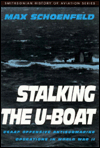Red Star Under the Baltic
A First-Hand Account of the Life on Board a Soviet Submarine in World War Two
Victor Korzh
2005,
ISBN 1844151387
Hardback, 224 pages, 8 pp B&W, 1-84415-138-7, $32.99
| Type. | Memoir/Reminiscence |
| Pros. | Rare look into Soviet WWII U-boat operations through the eyes of a chief engineer |
| Cons. | None worth noting |
| Rating. |  |

The vast majority of ink spilled on WWII submarines has centered upon German U-boats and the Allied effort to defeat them. The reason is understandable: the German U-Boat campaign offers readers an impressive array of engagements, personalities, and technological advances; its geographic scope was substantial, blanketing the Atlantic Ocean from its icy northern reaches to its balmy southern climes, and around Africa's horn into the Indian Ocean; and many of its commanders and crewmen have made themselves available for interviews, commentary, and have written about their experiences.
Unfortunately, history's laser-like focus on German U-boats has made it more difficult for studies on other aspects of WWII submarine warfare (including the role American submarines in the Pacific played in defeating imperial Japan) to receive the publicity and readership they deserve. A particularly heavy shroud has covered Soviet submarine operations from 1939-1945, and the fact that this small navy helped Britain and the United States defeat Nazi Germany. Hopefully, Korzh's "Red Star under the Baltic" will buck this unfortunate and undeserved trend.
By training a mechanical engineer, Korzh served as the chief engineer on three different Soviet boats on and under the Baltic Sea. His account graphically details life and death on what many have called "a German lake." Indeed, the Baltic was an exceedingly treacherous place for enemy submarines. A quick glance a map of this region will show you why this was so. Navigationally, the long and narrow island-strewn Baltic was a complicated body of water to operate in, and its shallow depth made hiding from hunting warships doubly difficult (and in many cases, fatally impossible). When the Germans captured the Soviet bases in the central sea region early in the war, the Soviet Baltic Fleet retreated northeast to Kronstadt and Leningrad. The Kriegsmarine did its best to bottle these submarines up in the narrow reaches of the Gulf of Finland, and blanketed the narrow entrance with a nearly impenetrable anti-submarine defensive network of tens of thousands of mines, anti-submarine nets, shore-based artillery, surface warships, and air cover.
"Red Star" was written in the early 1960s, when the events portrayed were still reasonably fresh in the author's mind, and originally published in Russian in 1966 under the title "Reserve of Strength." Presented in the first person, Korzh's superb record details the abysmal life and death conditions Soviet sailors endured on their primitive but stoutly constructed boats.
As readers will quickly discover, Korzh was one lucky sailor. His first patrol in early 1942 was aboard S-7, which returned safely only to be torpedoed by a Finnish submarine on its next patrol. The entire crew was lost except for those fortunate enough to have been on the bridge when disaster struck. Korzh, however, was not aboard because he had been transferred to another boat, S-12. His extensive second patrol sank two freighters and returned safely after suffering heavy depth charging and a very narrow escape. S-12 was lost with its entire crew the following year, but the lucky Korzh had again been posted to a third boat, jumping again off the devil's shovel. His third patrol in March 1945 was aboard L-21, a large mine-laying submarine. The patrol was exceedingly successful and accounted for three warships and a tanker.
"Red Star" will interest everyone who enjoys reading about WWII naval matters in general, and U-boats in particular. Authentic Russian accounts of naval service are very rare, and memoirs in a frontline submarine exceedingly so. Everyone familiar with Das Boot and life aboard German U-boats will appreciate and see obvious similarities between that account and Korzh's recollections: hardship, terror, comradeship, and death. German accounts of life aboard a U-boat in 1944 and 1945, when simply going to sea was the equivalent of a death sentence, are rare because so few crewmen from that period managed to survive. It was under similar conditions that Korzh and his comrades operated from 1942 onward in the dangerous waters of the Baltic. Viktor Korzh died in St Petersburg in 1993. "Red Star under the Baltic" is his legacy. Thankfully, it is now available in English. I highly recommend it.
Review written by Theodore P. Savas.
Published on 10 Mar 2005.
This title is highly recommended.
Purchase information: (info) Get Red Star Under the Baltic now at amazon.co.uk
Get Red Star Under the Baltic now at amazon.co.uk
Return to our main review page.



